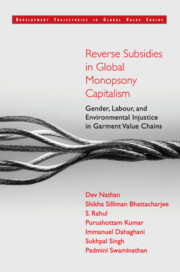 Reverse Subsidies in Global Monopsony Capitalism
Reverse Subsidies in Global Monopsony Capitalism Published online by Cambridge University Press: 21 January 2022
The upstream of agribusiness, which involves how raw materials are procured or where production takes place, is becoming increasingly important due to issues of social and environmental justice, as against downstream agribusiness, which relates to the purchase, use, and consumption of products as part of the product value chain (Schrempf-Stirling, Palazzo and Phillips 2013). It is not just market failures that lead to externalities—which can, therefore, be attended to with market-based systems—but it is also the ‘cost shifting’ that acts as an externality on those who are either smaller players in the chain or non-participants (Martinez-Alier et al. 2016: 732). Further, agribusiness companies working with primary producers (farmers) are driven solely by the profit motive at most times and tend to ignore the social dimensions of their operations (S. Singh 2016). Examples of such behaviour include abandoning an area if it is found to be unprofitable to continue; excluding small and marginal growers from their operations; and following the practice of ‘agribusiness normalization’, in which lower prices are offered to producers over time or prices are not raised adequately to cut down costs of procurement (Glover and Kustrer 1990: 63).
Most environmental regulations do not help in enhancing revenue; they typically increase cost and reduce the capacity of businesses to generate cash flow (Boehlje, Akridge and Downey 1995). Engaging in social responsibility is considered the key challenge for global sourcing companies and their suppliers in the developing world though it is more challenging to meet regulations. Even more problematic is the belief that if suppliers from a developing country comply with codes of conduct (CoC), it will improve the workers’ conditions and reduce environmental pollution; that is not necessarily the case as the objective conditions prevailing locally are different, for example, overtime and child labour, which are difficult to deal with. More importantly, believing that exclusion of non-complying suppliers is an effective way of securing compliance with codes or standards and, in turn, of improving the conditions of producers or workers and the environment is misplaced as such actions only harm by downgrading such producers or workers (Lund-Thomsen 2008).
Achieving environmental sustainability or upgrading, along with economic and social sustainability, is a part of the ‘triple bottom line’ or three Ps (profits, people, and planet) of corporate entities (Sindhi and Kumar 2012; Campling and Havice 2019).
To save this book to your Kindle, first ensure [email protected] is added to your Approved Personal Document E-mail List under your Personal Document Settings on the Manage Your Content and Devices page of your Amazon account. Then enter the ‘name’ part of your Kindle email address below. Find out more about saving to your Kindle.
Note you can select to save to either the @free.kindle.com or @kindle.com variations. ‘@free.kindle.com’ emails are free but can only be saved to your device when it is connected to wi-fi. ‘@kindle.com’ emails can be delivered even when you are not connected to wi-fi, but note that service fees apply.
Find out more about the Kindle Personal Document Service.
To save content items to your account, please confirm that you agree to abide by our usage policies. If this is the first time you use this feature, you will be asked to authorise Cambridge Core to connect with your account. Find out more about saving content to Dropbox.
To save content items to your account, please confirm that you agree to abide by our usage policies. If this is the first time you use this feature, you will be asked to authorise Cambridge Core to connect with your account. Find out more about saving content to Google Drive.